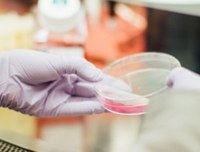
A research group led by the University of Bologna identified a new mechanism that allows to obtain serological tests that are quicker, more cost-effective and more reliable than those currently in use. This mechanism is based on the technique of electrochemiluminescence (ECL) and is applicable to serological tests devised to detect the antibodies against SARS-CoV-2. The future of this innovative technique is an industrial application, as two leading firms in the fields of diagnostics and technologies, were also involved in this research: the Germany-based Roche Diagnostic and the Japanese Hitachi High Tech.
The study was published on Nature Communications and its outcomes show serological tests with increased sensitivity levels up to 128% more than those currently in use is possible thanks to highly efficient reactants.
"The results we obtained mark a new milestone in the state of the art of signal enhancement of ECL-based immunoassays", says Francesco Paolucci leader of the research group and professor at the University of Bologna. "This milestone is the outcome of years and years of international research into electrochemistry and of a close synergy with R&D sectors".
Serological tests are based on the ability to translate into measurable and visible signals the interactions between some molecules and the antibodies the test intends to quantify. ECL can play a major role here, as it relies on an electrochemical reaction producing a light signal. In the case of serological tests, electrochemiluminescence "switches on" the antibodies as if they were lamps.
This mechanism has, however, some limitations: the molecules that are able to prompt this reaction are in very low concentrations in the human blood. Therefore, we need highly-sensitive techniques to identify the antibodies in the blood. The results obtained by this research group seems to go exactly in this direction.
"Our work represents something unprecedented in the field of ECL because it relies on the enhancement of the signal as opposed to the enhancement of the target as it usually happens with enzymatic methods or PCR (Polymerase Chain Reaction)", explains Giovanni Valenti, study coordinator and researcher at the University of Bologna. "These results pave the way for the development of ultra-sensitive serological tests".
The researchers obtained a twofold result with this study. On the one hand, they refined the mechanisms regulating ECL analyses; on the other hand, they employed these mechanisms to develop new reactants that allow to obtain far more efficient serological tests.
"From these results, we managed to identify highly efficient reactants that are able to enhance the sensitivity of this technique way beyond that currently employed for serological tests", confirms Alessandra Zanut, first author of the study and researcher at the University of Bologna. "With this technique, we obtained an ECL signal enhancement up to 128% compared to current techniques".
The title of this study is “Insights into the mechanism of coreactant electrochemiluminescence facilitating enhanced bioanalytical performance” and was published on Nature Communications. It was carried out by a research group at the Chemistry Department "Giacomo Ciamician" of the University of Bologna.
The research coordinators are Francesco Paolucci and Giovanni Valenti, in collaboration with Fabrizia Negri. Alessandra Zanut, Andrea Fiorani, Sofia Canola, Stefania Rapino, Sara Rebeccari and Massimo Marcaccio also participated in this research. Finally, this study saw the collaboration of researchers at the University of Padua as well as at Roche Diagnostic and Hitachi High Tech.
